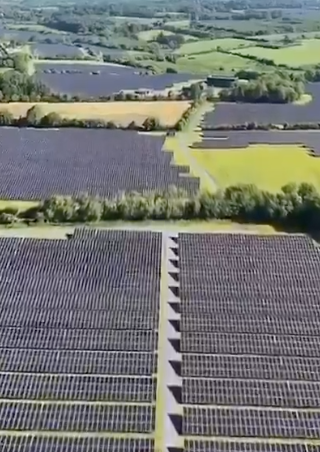Protect Farmland, Preserve Food: Why Solar Panels Belong on Rooftops and Brownfield Sites

The dispute over the deployment of solar panels on valuable agricultural land in the UK is sparking widespread interest. Critics contend that large-scale solar farms on fertile farmland jeopardise food production and detract from the countryside’s natural beauty. They are pushing for alternate solar installation sites such as brownfield sites, car & lorry parks and rooftops. And the facts and figures behind this are persuasive.
Impact on Food Production
The UK government emphasises the importance of protecting ‘Best and Most Versatile’ (BMV) agricultural land, which is classified as Grades 1, 2, and 3a. This land is deemed most suitable for producing food and should be preserved for agricultural use. Guidelines suggest that large solar projects should avoid BMV land and instead utilise brownfield sites, contaminated land, industrial areas, and lower-quality agricultural land to prevent compromising the UK’s food security.
The Campaign to Protect Rural England (CPRE) argues that there is sufficient space for solar panels on rooftops, brownfield sites and car parks to meet the UK’s solar power targets without encroaching on valuable farmland.
Alternative Sites for Solar Installations
Brownfield sites, previously developed lands that may be contaminated or derelict, present viable alternatives for solar farms. These sites are often unsuitable for agriculture or housing but can be repurposed for renewable energy projects. Developing solar farms on brownfield sites can revitalise these areas and contribute to energy production without affecting food supply.
Car parks and rooftops also offer substantial potential for solar energy generation. Installing solar panels on these surfaces can provide clean energy directly to the buildings they serve, reducing transmission losses and enhancing energy efficiency. This approach minimises the need to use agricultural land for energy production.
Government Policy and Public Opinion
The UK government has reiterated its commitment to balancing energy security with food production. In recent statements, officials have emphasised that solar projects should be developed on non-agricultural land to protect food security. This policy direction aligns with public concerns about the use of farmland for non-agricultural purposes.
A recent poll indicates that nearly 90% of voters believe safeguarding UK-produced food is as important as securing domestic energy supplies. This sentiment underscores the public’s desire to prioritise food security alongside renewable energy development.
Conclusion
While the expansion of renewable energy is crucial for meeting climate goals, it is essential to consider the implications of land use decisions. Utilising brownfield sites, car parks, and rooftops for solar installations can achieve energy targets without compromising food production or the beauty of our countryside. This balanced approach ensures that the UK can advance its renewable energy agenda while preserving its agricultural heritage and food security.
Sources:
- Solar projects must fit in with food security – GOV.UK
GOV.UK - Planning for solar farms – UK Parliament
Research Briefings - Brownfield solar farms – Ethical Power
Ethical Power - Focus on fishing and food security, say voters – The Times
The Times
